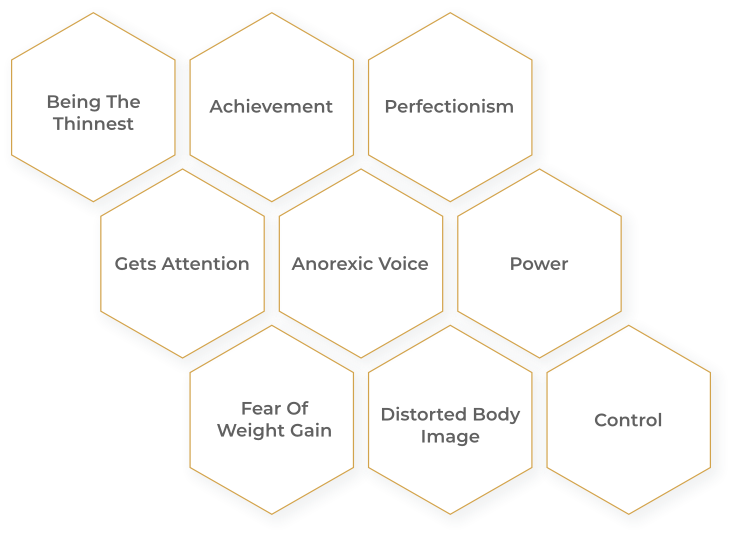Eating Disorder Outpatient
- Personalised, Holistic Care: We Create a Unique Plan Tailored To Your Individual Needs
- Compassionate Support: We Listen With Kindness & Provide Structure To Enable Recovery
- Empowering You: We Equip You With Tools & Strategies To Build a Healthier Relationship With Food & Your Body
EATING DISORDER OUTPATIENT SUPPORT: TRANSITIONING HOME
Your Journey To Lasting Recovery Starts Here
Leaving the structured environment of inpatient care, after your admission for an eating disorder, and returning home can be a daunting experience, and you may be asking yourself questions about the transition.
- How will I manage my meals and avoid falling back into old patterns?
- What if I’m overwhelmed by stress or triggers in my everyday life?
- Can I really handle this on my own without the constant support of the hospital team?
- How will my relationships and family dynamics be affected?
- What will it be like returning to my social groups, and being around people?
These fears and uncertainties are normal, and we’re here to help.
Our experienced multidisciplinary team (MDT) combining therapy, nutrition and psychiatry will provide you with structured, personalised support to address these challenges and guide you towards lasting recovery.

THERAPY
Cognitive remediation techniques to support greater cognitive flexibility and reduce stress when routines become disrupted. DBT techniques to challenge excessive control, and support you living with uncertainty.

NUTRITION
Personalised meal plans created in collaboration with you, to balance biochemistry and restore health. Support with meal plans and managing eating with others, to support your recovery.

PSYCHIATRY
Assessment and medication management for any underlying mental health conditions that may be contributing to your eating disorder.
We understand the complexities of eating disorders and the importance of a holistic approach that encompasses medical, nutritional, and psychological well-being.
Don’t face this transition alone. With our compassionate and expert guidance, you can navigate the challenges of returning home, rebuild your life, and find lasting freedom from your eating disorder.
Contact us today to ask any questions about this service, and let us create a bespoke care and treatment plan that empowers you to embrace a healthy and fulfilling future.
TAKE CONTROL OF YOUR HEALTH TODAY – WE ARE HERE TO HELP
Struggling with weight and eating challenges? You don’t have to face it alone.
Our compassionate team is ready to listen, support, and guide you toward a healthier, happier life.
Book your free call now and take the first step.
OUR FEES
Our initial consultation is free of charge, with health coaching sessions starting from £90, therapy sessions at £120, and nutrition consultations from £200.
Health packages and multi-session bundles available – we’ll guide you to the most suitable option when we speak.
MEET CHRISTINE, OUR ANOREXIA CLINICAL LEAD
Christine explains how we support clients who are transitioning home after inpatient treatment for an eating disorder.
Outpatient Support
You may have experienced inpatient treatment in hospital, and now you are ready to take the next step in your recovery, and progress to outpatient care. However, this process can be scary and intimidating.
You may fear that in resuming control over your food and eating, that your old patterns of thinking will take over and prevent you from recovering. You may feel anxious about navigating the outside world again and coping with stressful life events.
At WeightMatters, we have an experienced and dedicated team to help you manage your transition from an inpatient setting to resuming life at home.
We offer a complete package including intensive therapy, meal support from our dietetic team and support for your family members, who may be unsure how to most effectively support you at this time.
Each package is tailor made to suit each individual client and their specific life context. Some clients have a clear idea of the help they are looking for, while others are less clear. We want to make sure that we find the right approach for you, and one of our strengths is listening carefully so we can fully understand your needs.
Treatment packages include personalised psychological and nutritional programmes, supplemented by psychiatric support and medical liaison.
The transition from being in hospital to being back at home, although positive can also present challenges. We tailor our therapy programmes around each individual’s needs. This could be daily to begin with daily support, or sessions several times a week. We recognise that everyone is different and we are here to understand your needs and what works best for you.
We offer the opportunity to begin work with our psychiatrist if needed, and we will liaise with your G.P to manage your medical needs. It is important that we work as part of a ‘Golden Triangle’ where we look after and meet all of your physical, emotional and nutritional needs.
On this page you find more information about our assessment process, and what your treatment may look like. Your plan will be tailored to your personal needs, and may vary from person to person.
Initial Assessments
Providing Safe Outpatient Support
We provide outpatient support for this programme online, so it is important that we carefully assess if we can safely provide you with the treatment and support you need.
For this reason, we will liaise closely with your NHS GP to ensure in-person medical checks and monitoring is maintained.
Initial Psychological Assessment
So the first step before starting treatment is to have an initial assessment with our anorexia clinical lead therapist, Christine Everley. This assessment aims to:
- Understand your personal experiences with anorexia and your journey to this point
- Define your treatment goals and what recovery means to you
- Identify potential obstacles or barriers that could affect your recovery
- Evaluate your readiness for change and address any concerns
This initial assessment is crucial for creating your personalised treatment programme, ensuring that your unique needs are met.
Nutritional Assessment
You will also have a dietitian assessment, before any treatment starts, to evaluate your current nutritional status and future needs. This assessment may include:
- Examining your past eating patterns
- Reviewing current and past medical reports
- Conducting functional tests to identify underlying imbalances
Psychiatric Assessment
In some cases, your assessment may also require an initial psychiatric assessment. This may be necessary if you have a complex recovery history, take medication, or have other mental health conditions that require attention.
Bespoke Treatment Plan
Following these assessments, our multidisciplinary team will collaborate to create a personalised treatment plan tailored to your specific needs.

OUTPATIENT EATING DISORDER TREATMENT
At WeightMatters, we understand that disordered eating is complex and requires a comprehensive approach. Our team of specialists collaborates to provide integrated support, focusing on both the psychological and nutritional aspects of your journey to recovery.
By addressing the emotional, behavioral, and dietary factors contributing to your eating disorder, we can help you build a healthier relationship with food and your body.
Let our experienced eating disorder team take the time to understand your struggle, and develop a bespoke programme for you, that transforms your life.
It is time to feel hopeful, heal, and start your journey to recovery.
Therapy
Individual Therapy
Initially, you will meet with your therapist three times per week to support your transition from inpatient to outpatient care. This frequency can be adjusted to meet your needs as you progress through treatment. Our therapists specialise in a range of psychological approaches and can use various tools and techniques to guide your recovery from anorexia.
Cognitive Remediation Therapy (CRT)
CRT is an evidence-based treatment that can help improve your emotional, social, and cognitive functioning. We will work with you to enhance your cognitive flexibility, enabling you to relax rigid rules around food and eating and reduce distress when your routines are disrupted.
CRT can also help you reduce your focus on details like calorie counting and broaden your perspective. Through various activities and techniques, we can help you contextualise your thoughts and behaviors and improve your symptoms.
Dialectical Behavior Therapy (DBT)
Our experienced therapists also offer Radically Open Dialectical Behavior Therapy (RO-DBT), specifically designed to help people struggling with disorders characterized by excessive control, a key characteristic that maintains anorexia and can trap you in a cycle of disordered behaviors.
Your therapist can work with you to increase your flexibility, so you can adapt to different situations without becoming overwhelmed and returning to over-controlling behaviors.
Family/Couples Therapy
If you have close people in your support system, your treatment plan may include therapeutic support in the form of family or couples therapy. Interpersonal dynamics may be an important factor in maintaining disordered thoughts and feelings in anorexia. Working through these with the support of a family therapist can help promote recovery.
Family support sessions may include:
- Psychoeducation for Anorexia Nervosa
- Learning to manage interpersonal conflict
- Improving communication skills
- Developing stress management and emotion regulation skills
These therapy sessions might become a regular part of your treatment plan, or they may be arranged at different points, depending on your needs.
Remember that the specific interventions will always depend on your needs, preferences, and treatment goals.
Nutrition
Our dietitian will work closely with your lead therapist, and any other healthcare professionals as required.
Helen West is a clinical dietitian trained in eating disorders and has a lot of experience supporting a person returning home after inpatient care for an eating disorder. With a focus on continued health restoration, here are some interventions she may use:
- Personalised Meal Plan – This plan would aim to gradually increase caloric intake and normalise eating patterns while honoring your food preferences and cultural considerations.
- Supervised Meal Support – Offering support during mealtimes to coach you through anxiety, and challenge disordered thoughts.
- Nutritional Education – Providing education about the importance of balanced nutrition, dispelling myths about food, and helping you identify reliable sources of nutrition information.
- Grocery Shopping & Meal Preparation Guidance – Assisting you in learning how to shop for and prepare healthy meals and snacks.
- Regular Monitoring & Adjustment of the Plan – Track your progress and adjust the meal plan as needed to ensure adequate nutrition and weight restoration.
- Collaboration with the Multidisciplinary Team – Work closely with the therapist, psychiatrist, and other healthcare professionals to provide integrated care and address any challenges that arise.
- Addressing Specific Nutritional Deficiencies – Recommend supplements or specific food choices to address any nutritional deficiencies resulting from the eating disorder.
- Education and Support for Family and Loved Ones – Provide resources and guidance to family members or loved ones on how to best support your nutritional needs and recovery.
Remember that the specific interventions will always depend on your needs, preferences, and treatment goals.
Psychiatry
Our psychiatrist can offer the following interventions to support outpatient care for a person transitioning from inpatient treatment for an eating disorder:
- Medication Management – Assess and prescribe medication to address any co-occurring mental health conditions like anxiety, depression, or obsessive-compulsive disorder, which can often accompany eating disorders.
- Monitor for Medication Side Effects and Interactions – Regularly assess how medications are affecting the patient, both physically and mentally, and make any necessary adjustments.
- Manage Relapse Prevention – Work with the patient to develop strategies to identify and manage early warning signs of relapse and create a plan to prevent a return to inpatient care.
- Coordination with the Multidisciplinary Team – Collaborate closely with the therapist, dietitian, and other healthcare professionals to ensure a holistic and integrated approach to treatment.
- Psychoeducation – Educate the patient and their family about the nature of the eating disorder, the role of medication, and the importance of ongoing treatment.
Remember that the specific interventions will always depend on the your individual needs, preferences, and treatment goals.
Get help today
Start your healing journey
Contact us
Take the first step, reach out and talk to us.
You can refer yourself for treatment, or get a referral from a healthcare professional.
Call us on 020 7622 7727, email us a question or book a call.
Time to start
Share your experience
Our friendly and experienced team will listen carefully to your reason for contacting us.
They will ask some questions and match you to the service and practitioner that best fits your needs.
Time to ask
Your assessment
Your journey starts with your initial assessment session.
Your practitioner will explore your current situation, ask about your change goals, and create your bespoke treatment plan.
Time to understand
Treatment, healing & recovery
When you have agreed your treatment plan, you will meet with your practitioner / team to support your recovery.
We will support you every step of the way as you create a healthier relationship with weight, food and your body.
Time to heal
SERVICES WE RECOMMEND FOR EATING DISORDER OUTPATIENT SUPPORT
These services are essential in providing safe and effective care when transitioning home after an inpatient stay in hospital for an eating disorder.
NEURODIVERSITY POSITIVE PRACTICE
We have created a healthcare space where every brain is understood, respected and supported.
IF IT FEELS MORE COMFORTABLE, EMAIL US
Do you have a question about our treatment and support?
Leave your details below, and we will come back to you with a personalised response.
